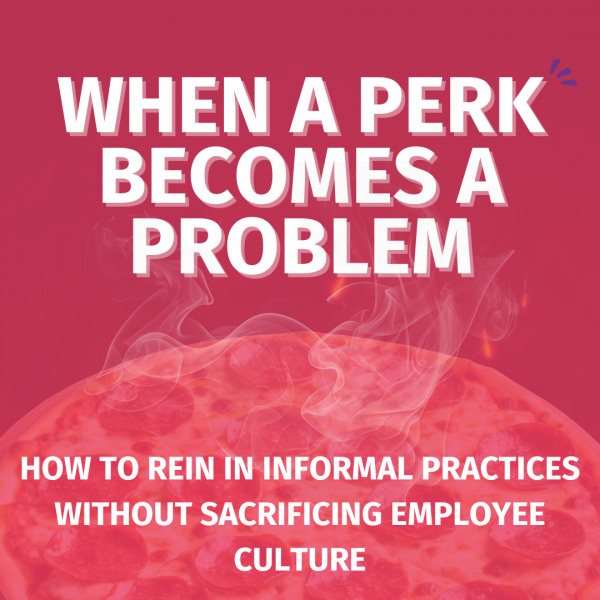
Small businesses often run on trust, flexibility, and informal agreements. Whether it’s letting employees leave early after a long day or giving staff a free item here and there, these unscripted perks can make a workplace feel more human. But what happens when a good-natured perk becomes a gray area—and then a problem?
Zach Abraham, Principal and CEO of AlignHR, shared a memorable example during the Beyond Compliance podcast. It came from a well-known local pizza shop, where a long-standing tradition created an unexpected challenge.
In this case, the shop allowed employees to take home leftover pizza dough or make a personal pie at the end of a shift. At first, it was understood and accepted—even encouraged. Over time, though, the line between perk and entitlement started to blur. Some employees were taking multiple pizzas. Inventory costs rose. The once-appreciated perk turned into a source of tension and, eventually, conflict.
The business owner wanted to stop the practice, but the move sparked resistance. Employees saw it as a benefit that had always been part of the job. From their perspective, the policy wasn’t changing—it had never existed in writing to begin with.
This is a situation many small business owners face: how to reinforce boundaries or scale back a benefit without damaging trust or morale.
It’s common for businesses to develop unspoken norms. When something happens often enough, and leadership allows it, it becomes part of the culture—even if no one ever documented it. That’s why Zach and the AlignHR team approach these situations carefully.
“The first thing we do is ask a lot of questions,” Zach explained. “Why do you want to change this practice? What’s the history of it? What’s the impact?”
By understanding both the employer’s goals and the employees’ perceptions, businesses can make informed decisions that protect both their operations and their culture.
When a business allows informal perks to continue without boundaries, it creates room for:
In this case, what started as a “pizza perk” turned into an inventory control issue. But it could just as easily be related to overtime, comp time, break times, or shift trades.
If one employee takes advantage of an unwritten rule—or if a new manager starts enforcing it differently—frustration builds. Without something clear to refer to, it becomes a matter of opinion, not policy.
Zach’s approach to these situations isn’t about drawing a hard line immediately. It’s about being intentional and collaborative. Here are steps any business can take:
Before changing or eliminating it, recognize what the practice means to your team. Ask questions and listen to their input. Sometimes a perk has become a point of pride or loyalty.
Be transparent about why a change is needed. Is it financial? Is it about fairness? Is it causing confusion or inconsistency? Letting people see the full picture increases their understanding.
If the perk can’t continue in its current form, consider offering a modified version. For example: “Instead of unlimited leftover pizza, we’ll allow one personal pie per week.” This preserves some goodwill while still setting limits.
Once a new policy is decided, document it. Communicate it clearly. Explain the “why” behind the decision—not just the “what.”
This is key. If the policy only applies to some employees or isn’t enforced regularly, it can create even bigger issues.
Zach put it simply: “If you don’t define how you want things done, your culture will define itself—whether you like it or not.”
Perks can be a great part of culture, but they shouldn’t come at the expense of structure or accountability. Businesses that take the time to clearly define expectations and communicate with empathy often build the most lasting and positive cultures.
It’s not about eliminating kindness or flexibility. It’s about being proactive instead of reactive, and helping both employees and managers understand the rules of the road.
AlignHR works with small and mid-sized businesses to navigate these exact situations. Whether it’s crafting better policies or coaching managers through tough conversations, their team believes HR should strengthen—not stifle—your workplace culture.
Visit AlignHR.com to learn more about how AlignHR can help your team grow with clarity and purpose.
This blog is based on Episode 1 of Beyond Compliance, a podcast from AlignHR. Listen to Zach Abraham and Luke Hladek talk through real-world HR challenges and share practical solutions for business owners and leaders.
Catch the full episode below—and don’t forget to subscribe to hear future insights and interviews.